Nicholas Burns, the US Ambassador to China, has been the victim of a brazen cyberattack orchestrated by Beijing-linked hackers.
According to an exclusive report by The Wall Street Journal (WSJ) on Thursday, this plot potentially compromised hundreds of thousands of sensitive US government emails.
But the drama does not end there.
The WSJ report also revealed that Daniel Kritenbrink, the assistant secretary of state for East Asia, was also caught up in this broader spying operation recently uncovered by Microsoft.
With such high-profile targets falling prey to this cyberattack, the stakes couldn’t be higher.
The US State Department, always attentive to its diplomatic secrets, remains silent on the details of this breach.
During a congressional hearing on US-China policy, Kritenbrink, deeply involved in this spy saga, was asked if he could rule out that his emails or those of his staff were taken in the Microsoft hacking sight.
“I can’t comment on an ongoing FBI investigation, but no, I won’t rule it out,” he commented.
Burns and Kritenbrink now join the ranks of espionage victims, alongside US Secretary of Commerce Gina Raimondo, whose name has also been released publicly in this shocking campaign of cyber intrusions.
The fallout has been so immense that even Washington’s top diplomat felt compelled to issue a stark warning to his Chinese counterpart.
In response, the Chinese Embassy in Washington denied any involvement in cyberattacks or thefts.
According to Liu Pengyu, spokesperson for the embassy, China’s position on these issues is “consistent and clear”.
The spotlight is not just on Beijing, but also on tech giant Microsoft, whose security practices are under intense scrutiny.
The recent revelation that Chinese hackers exploited a flaw in Microsoft’s code, stealing emails from US government agencies and other customers, has raised eyebrows around the world.
Amid the chaos, Microsoft has yet to respond to the WSJ report.
As the pressure mounts, calls are growing louder for Microsoft to provide its high-level digital audit, known as logging, to all customers free of charge.
The US government detected the anomalous activity early and quickly hardened its systems to ward off any further breaches.


